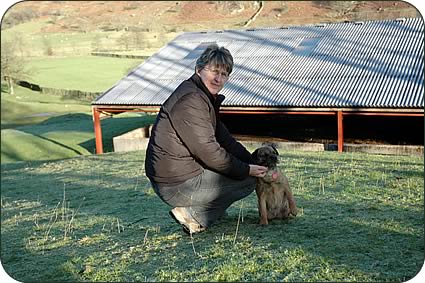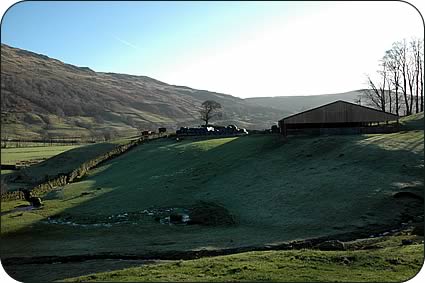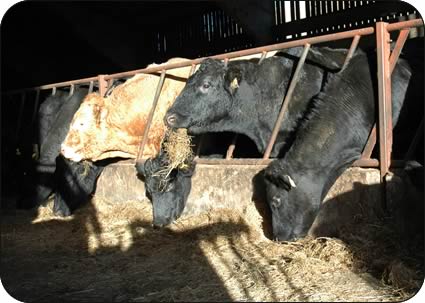Jennifer MacKenzie is an agricultural photo journalist with almost 30 year's experience. Operating from her base in Cumbria, Jennifer undertakes mainly industry-related freelance writing and photography.
Roofed Midden benefits Lake District Farm
Simply roofing over a midden on a Lake District hill farm has made all
round benefits to the environment and in savings on labour and other costs.
Mick and Christine Booth run a mostly home-bred 35 cow Limousin cross suckler herd and 750 ewes with followers at Hartrigg Farm in the Kentmere valley north of Kendal.
The beautiful valley, which is in the Lake District National Park, is a magnet for hill walkers.
Farming at 1,000ft with grazing rights on Kentmere common at up to 2,600ft, the farm has a high rainfall of up to 100 inches a year and the Booths largely run the farm single-handedly but have occasional help for gathering and from their son Tony.
 |
| Christine Booth with the roofed midden |
Thanks to a grant from Farming Connect Cumbria the Booths were able to roof the slurry midden, probably trebling its capacity by excluding the rainwater, as well as making necessary repairs to the midden itself to prevent possible run-off to a nearby beck.
The midden can now provide up to 10 weeks’ storage for the slurry.
“It has cut down the number of times we had to empty the midden and now we can make the most use of the manure and spread it when we want to which has helped us cut our fertiliser bills, labour time and the use of machinery,” said Mick Booth. “It also means we can avoid spreading when it is wet to meet our cross-compliance requirements.
“Because the midden was leaking we knew we had to do something about it. It was fortunate that we got the grant as I don’t know where the finance would have come from.
“We probably would have had to consider not keeping the cows but the cattle are important to manage the landscape and to work within the constraints of the Lake District ESA scheme.”
The Booths moved from Austwick, near Settle, where they farmed 150 acres eight years ago to take on the tenancy of the Kentmere farm.
 |
| Hartrigg Farm |
The holding was already in the ESA and since then the Booths have renewed the agreement for a further term and now it has five years left to run.
They took on the hefted flock of Swaledales which are all bred pure and they also run Cheviots.
The Limousin cross cows are put to the Blonde bull with all calves being sold at around 10 months old at Kendal auction market.
The grant has enabled the Booths to manage their existing cattle numbers more effectively.
The cows and calves are housed from October to May in the cubicle house and the passageway is scraped out each day – because of cost the use of straw is kept to a minimum. Because of the ESA agreement, cattle can not be outwintered because of potential poaching.
The midden, constructed of block walls and a concrete floor, was repaired and sealed by local agricultural buildings specialist Ian Pickthall who also constructed the roof. The Booths’ landlord contributed to cost.
“The Environment Agency was very supportive and helped us and they think the improvements are first rate,” said Mick.
Mick Booth first learned about grant aid from Farming Connect Cumbria at a meeting. The couple began planning the roof in the summer of 2005 and receiving estimates.
This NWDA funded scheme provided them with business advice from CREA’s Farm Link advisers, and helped them to put together what proved to be a successful application for grant aid in February 2006 and they were awarded the maximum amount for their project.
The Booths had previously had an environmental assessment of the farm carried out by CREA in 2004 and information from this was used in their application.
 |
| Limousin cross sucklers |
CREA Farm Link advisers who helped the Booths were business adviser Chris Stables and environmental adviser Reg Hesketh.
“The major part of the cost was the roofing and without the grant we would have just been able to carry out the repairs to the midden – and we would still be spreading the slurry all winter.
“This is only our second winter since the roof was put on the midden and so it’s difficult to know what all the benefits are going to be long-term but one of the main things it has given us is peace of mind,” said Mick.
“If grants for capital work were still generally available it would
make a big difference to improvements on farms.”

